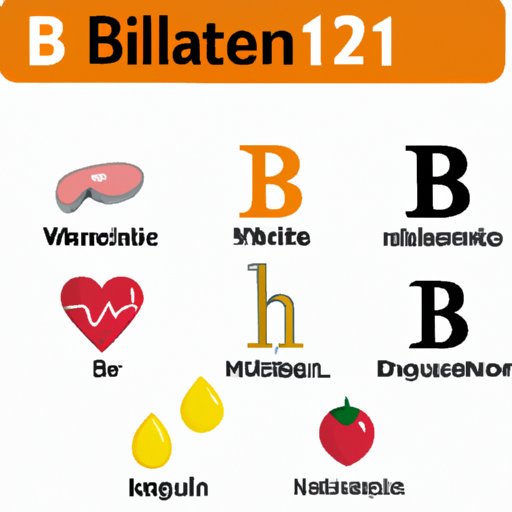
Introduction
Vitamin B1, also known as thiamine, is an essential nutrient that plays a vital role in maintaining good health. This water-soluble vitamin is responsible for converting food into energy, supporting the nervous system, and maintaining a healthy cardiovascular system. In this article, we will explore the various benefits of vitamin B1, the consequences of its deficiency, and ways to ensure adequate intake through diet and supplementation.
The Importance of Vitamin B1 for Nervous System Functioning
Vitamin B1 is essential for the proper functioning of the nervous system. It is required for the synthesis of neurotransmitters, which are chemicals that facilitate communication between nerve cells. Thiamine also plays a crucial role in the maintenance of the myelin sheath, which is a protective layer that covers nerve cells and aids in their functioning.
A deficiency in vitamin B1 can lead to nervous system disorders such as beriberi and Wernicke-Korsakoff syndrome. Beriberi is a condition that affects the cardiovascular and nervous systems, while Wernicke-Korsakoff syndrome is a type of brain disorder that occurs due to prolonged alcohol abuse and malnutrition.
How Vitamin B1 Benefits the Body’s Energy Metabolism
Vitamin B1 helps the body convert food into energy. It is a necessary cofactor in the conversion of carbohydrates into glucose, which is a primary source of energy for the body. Thiamine is also involved in the metabolism of fats and proteins.
A healthy metabolism is essential for maintaining optimal body weight and preventing chronic diseases such as diabetes and heart disease. Vitamin B1 plays a significant role in ensuring a healthy metabolism throughout the body.
The Role of Vitamin B1 in Maintaining a Healthy Cardiovascular System
Vitamin B1 is vital for maintaining a healthy cardiovascular system. It helps regulate heart function by aiding in the propagation of nerve impulses and promoting the relaxation of smooth muscles in blood vessels.
A deficiency in vitamin B1 can lead to cardiovascular disorders such as heart failure, which occurs due to the weakening of the heart muscles and reduced oxygen supply to the body. Ensuring adequate intake of thiamine is essential for maintaining a healthy heart and reducing the risk of cardiovascular diseases.
Vitamin B1 Deficiency: Causes, Symptoms and Treatments
The causes of vitamin B1 deficiency include poor diet, chronic alcohol consumption, and malabsorption disorders such as Crohn’s disease and celiac disease. Symptoms of vitamin B1 deficiency include fatigue, muscle weakness, memory loss, confusion, and numbness or tingling sensations in the hands and feet.
Treatment of vitamin B1 deficiency involves increasing intake through diet and supplementation. For severe cases, intravenous thiamine supplements may be necessary. Clinical supervision is essential when treating vitamin B1 deficiency to ensure proper monitoring of symptoms and avoid any complications.
Foods High in Vitamin B1 and Their Health Benefits
Some foods that are high in vitamin B1 include whole grains, legumes, pork, beef, nuts, and seeds. Consuming a diet rich in these foods can provide several health benefits, such as reducing the risk of cardiovascular diseases, maintaining a healthy metabolism, and promoting proper nervous system function.
Whole grains such as brown rice, oats, and quinoa are good sources of vitamin B1 and also provide fiber, vitamins, and minerals. Legumes such as black beans, lentils, and chickpeas are high in protein, fiber, and thiamine. Nuts and seeds such as sunflower seeds, flax seeds, and pistachios are also high in thiamine. Including these foods in your diet can be an easy and delicious way to ensure adequate intake of vitamin B1.
The Connection between Vitamin B1 and Brain Health
Vitamin B1 is essential for maintaining proper brain function. It is required for the synthesis of acetylcholine, a neurotransmitter that is necessary for memory and other cognitive functions. Vitamin B1 also helps prevent the onset of dementia and cognitive decline later in life.
Evidence shows that proper intake of vitamin B1 may reduce the risk of Alzheimer’s disease and other forms of dementia. Ensuring adequate intake of thiamine can, therefore, contribute to overall brain health and cognitive function.
Vitamin B1 Supplementation: How Much is Safe and Effective?
Vitamin B1 supplementation can be an effective way to ensure adequate intake of thiamine. However, it is essential to ensure that you are taking the appropriate dose and form of thiamine.
The recommended daily intake of vitamin B1 for adults is 1.2–1.4 mg per day. However, individuals with certain conditions such as alcoholism and gastrointestinal disorders may require higher doses. It is essential to speak with a healthcare provider before starting any new supplement regimen to ensure safety and effectiveness.
Conclusion
Vitamin B1 is an essential nutrient that is necessary for maintaining optimal health. It is responsible for maintaining a healthy nervous system, ensuring a healthy metabolism, and promoting cardiovascular health. Ensuring adequate intake of thiamine through a balanced diet or supplementation can provide numerous health benefits and reduce the risk of chronic diseases. As always, it is essential to consult a healthcare provider before making any significant changes to your diet or supplement regimen.





